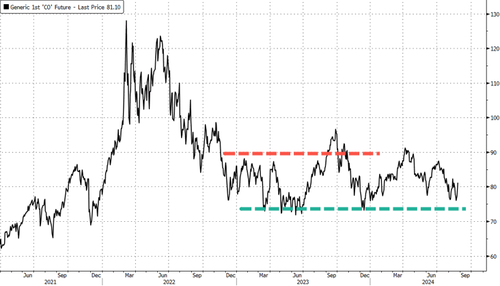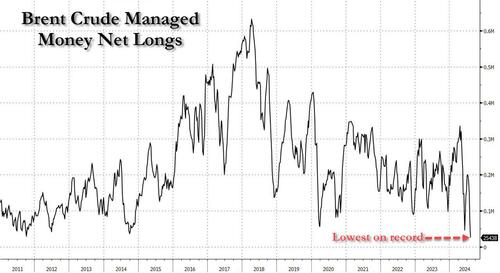
Brent crude prices are surging above the $81/bbl mark on Monday morning, driven by two major headlines:
- Middle East on edge after Israeli strike on Hezbollah targets in southern Lebanon
- Libya's eastern-based government said it will stop all oil production and exports
The primary driver between the two headlines is Bloomberg's report that Libya's eastern government plans to shut down oil production and exports after its Tripoli-based rival moved to replace the central bank leadership.
Libya Eastern Govt Says It Will Stop All Oil Production, Export
— zerohedge (@zerohedge) August 26, 2024
Eastern authorities said the declared "force majeure" applies to all oil fields, export terminals, and all other oil facilities.
Infighting between the two governments has been ongoing for the last week, centering around who leads the Central Bank of Libya (CBL). There are mounting risks that a UN-brokered peace deal could collapse.
"The internationally acknowledged government in the country's west has been seeking to replace the governor Sadiq Al-Kabir, who has refused to step down. A government delegation entered the regulator's offices today to take over," according to Bloomberg.
Here's more on the situation from Bloomberg:
The announcement comes amid an attempt to oust CBL governor Al-Siddiq al-Kabir. Earlier this month, the Tripoli-based Presidential Council (PC) voted unanimously to appoint Mohammed al-Shukri as CBL governor, replacing Al-Kabir.
Over the weekend, local media outlets reported that the new board had taken up its duties and that armed men had abducted several CBL officials.
The east-based House of Representatives (HoR) and the High Council of State (HCS) both issued statements condemning what they described respectively as attempts to "storm" and "seize control" of the CBL - in apparent reference to the board taking up office at the CBL headquarters.
Last week, HoR Speaker Aguila Saleh had warned that removing Al-Kabir could result in shutting down oil production and stopping the transfer of oil revenues to the CBL.
In a separate Bloomberg report, the east-based government warned about "attacks" against employees at the CBL and the attempts by "outlaw groups" to enter "the CBL headquarters by force."
What's critical to understand is that a force majeure across all oil fields, ports, and installations will lead to the interruption of oil production, which totaled about 1.15 million barrels a day last month. The biggest oil field, Sharara, pumping about 270,000 barrels, has been halted.
What Happens if We Lose All of Libya’s Crude Oil Exports?
— Anas Alhajji (@anasalhajji) August 22, 2024
Daily Energy Report #Oil #Libya #OPEC #Russia #LNG https://t.co/UrSfvvIRdH pic.twitter.com/O1wL57sUpQ
Brent crude prices jumped 2.6% in markets to $81.09/bbl. Prices have been range-bound since early 2023, basing around the $75-$80 level and occasionally jumping above $90 on geopolitical risks stemming from the Middle East. Down pressure on Brent in recent months originated from economic slowdowns in China and risks mounting of a downturn in the US.
Two weeks ago, we outlined to readers that bullish positioning in Brent by investors was cut to the lowest level on record, mostly due to rising concerns over a global economic slowdown. To us, this signaled a 'price rebound' was ahead.
"Oil blockades are a time-honored tradition in Libya. Unlike recent ones, that have been driven mostly by locals demanding jobs and better living conditions and are relatively easy to resolve, this one is political in nature. Political blockades tend to last several months. A Libya disruption will likely amplify the price impact we've seen over the weekend from the latest round of the Israel-Hezbollah airwar," said Fernando Ferreira, director of geopolitical risk service at the Rapidan Energy Group.
Citigroup analysts noted earlier that a decline in exports could temporarily push Brent prices into the mid-$80s range. Combined with rising geopolitical risks in the Middle East, further deterioration could send crude prices even higher.
Brent crude prices are surging above the $81/bbl mark on Monday morning, driven by two major headlines:
The primary driver between the two headlines is Bloomberg’s report that Libya’s eastern government plans to shut down oil production and exports after its Tripoli-based rival moved to replace the central bank leadership.
Libya Eastern Govt Says It Will Stop All Oil Production, Export
— zerohedge (@zerohedge) August 26, 2024
Eastern authorities said the declared “force majeure” applies to all oil fields, export terminals, and all other oil facilities.
Infighting between the two governments has been ongoing for the last week, centering around who leads the Central Bank of Libya (CBL). There are mounting risks that a UN-brokered peace deal could collapse.
“The internationally acknowledged government in the country’s west has been seeking to replace the governor Sadiq Al-Kabir, who has refused to step down. A government delegation entered the regulator’s offices today to take over,” according to Bloomberg.
Here’s more on the situation from Bloomberg:
The announcement comes amid an attempt to oust CBL governor Al-Siddiq al-Kabir. Earlier this month, the Tripoli-based Presidential Council (PC) voted unanimously to appoint Mohammed al-Shukri as CBL governor, replacing Al-Kabir.
Over the weekend, local media outlets reported that the new board had taken up its duties and that armed men had abducted several CBL officials.
The east-based House of Representatives (HoR) and the High Council of State (HCS) both issued statements condemning what they described respectively as attempts to “storm” and “seize control” of the CBL – in apparent reference to the board taking up office at the CBL headquarters.
Last week, HoR Speaker Aguila Saleh had warned that removing Al-Kabir could result in shutting down oil production and stopping the transfer of oil revenues to the CBL.
In a separate Bloomberg report, the east-based government warned about “attacks” against employees at the CBL and the attempts by “outlaw groups” to enter “the CBL headquarters by force.”
What’s critical to understand is that a force majeure across all oil fields, ports, and installations will lead to the interruption of oil production, which totaled about 1.15 million barrels a day last month. The biggest oil field, Sharara, pumping about 270,000 barrels, has been halted.
What Happens if We Lose All of Libya’s Crude Oil Exports?
Daily Energy Report #Oil #Libya #OPEC #Russia #LNG https://t.co/UrSfvvIRdH pic.twitter.com/O1wL57sUpQ
— Anas Alhajji (@anasalhajji) August 22, 2024
Brent crude prices jumped 2.6% in markets to $81.09/bbl. Prices have been range-bound since early 2023, basing around the $75-$80 level and occasionally jumping above $90 on geopolitical risks stemming from the Middle East. Down pressure on Brent in recent months originated from economic slowdowns in China and risks mounting of a downturn in the US.
Two weeks ago, we outlined to readers that bullish positioning in Brent by investors was cut to the lowest level on record, mostly due to rising concerns over a global economic slowdown. To us, this signaled a ‘price rebound’ was ahead.
“Oil blockades are a time-honored tradition in Libya. Unlike recent ones, that have been driven mostly by locals demanding jobs and better living conditions and are relatively easy to resolve, this one is political in nature. Political blockades tend to last several months. A Libya disruption will likely amplify the price impact we’ve seen over the weekend from the latest round of the Israel-Hezbollah airwar,” said Fernando Ferreira, director of geopolitical risk service at the Rapidan Energy Group.
Citigroup analysts noted earlier that a decline in exports could temporarily push Brent prices into the mid-$80s range. Combined with rising geopolitical risks in the Middle East, further deterioration could send crude prices even higher.
Loading…







